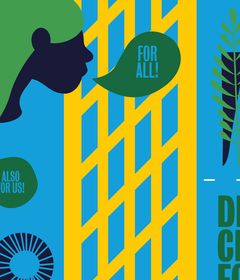Environment, social justice, economy – it’s become clear that our dominant systems are broken. In her 3-month DCFA Fellowship, Singapore-based urbanist Sarah Ichioka dives deeper into the possibilities for systemic change. What promising alternative systems and regenerative practices are already emerging around the world? And who is taking the first steps towards these essential changes?
In the fourth part of Designing Cities for All: RE-generation’s series Regenerative Design we look at expanded agency as a new paradigm for designers to work towards. Together with DCFA Fellow Sarah Ichioka and a multidisciplinary group of speakers, we reflect on the many different ways in which designers can increase their influence to enact cultural and political change, in coalition with others.






About the DCFA Fellow
Sarah Mineko Ichioka is an urbanist, strategist, curator, and writer. She leads Desire Lines , a strategic consultancy for environmental, cultural, and social-impact initiatives and organizations. Her latest book, Flourish: Design Paradigms for Our Planetary Emergency , co-authored with Michael Pawlyn, proposes a bold set of regenerative design principles for addressing our compound environmental and social crises. In previous roles Sarah has explored the intersections of cities, society, and ecology within leading international institutions of culture, policy, and research, including as Director of The Architecture Foundation (UK) and Co-Director of the London Festival of Architecture (both from 2008- 2014).
Watch Sarah’s introduction of her DCFA Fellowship on Regenerative Design below!
About the Speakers
Tara Gbloade is a Mayor’s Design Advocate and co-director of award-winning Gbolade Design Studio – an architecture practice specializing in residential and mixed-use developments for public and private sector clients through insight-led place-making. Tara advocates for responsible and equitable city-shaping as a trustee of the UK Green Building Council, and part of the Architects Declare steering group – organizations addressing our global climate emergency. Additionally, she is a co-founder of the Paradigm Network: a professional organization championing Black and Asian representation within the built environment.
Marc O’Brien is a climate designer, strategist, and design educator. From 2016–2022, he co-founded and ran The Determined, a design strategy and creative consulting studio for brands solving the climate crisis. Their goal: to make climate-focused projects look good, sound awesome, be seen and get the support they needed. He also co-founded Climate Designers, a global community of designers (and design adjacent creatives) across every industry who are committed to using their skills for climate action. He is also adjunct faculty at California College of the Arts in San Francisco, CA.
Angelina Kumar is an artist and social entrepreneur from India who is based in the Netherlands. In her practice, she is particularly interested in the commons, sustainable and ecological issues, and how these interrelate, intersect and practically take shape when applied to specific local contexts. By conducting local research, forging collaborations with like-minded partners, and using art and culture to create experimental sustainable platforms, she aims to establish more healthy and balanced ecosystems.
Victoria McKenzie is an academic activist, educator and artist. Her work focuses on the interconnections and entanglements of Earth where the realms of the individual, collective (human and more-than-human) and systems align. Trained in Research Architecture and Ecology, Victoria currently runs an architectural-research agency called ‘RRA’ Radical Research & Re-storying Agency which is informed by the question: “ how can the pre-colonial past inform a decolonial future? ”. Both Victoria’s research and practice are grounded in the ways by which building, being and communingare aligned. She has worked with a variety of architectural practices and arts institutions such as ICE Institute for Creative Exchange, Cittadellarte, Triennale di Milano, Amisacho Restoracíon, Somerset House, Forensic Architecture, and Royal Academy of Design at the Hague—to connect art, design, politics and ecology in order to continuously communicate, dream and make new futures into existence.
About Designing Cities for All: RE generation
Over the past two years of Designing Cities for All (DCFA), we’ve learned about exclusion by design and the (re)design of inclusive cities. Along the journey, a certain question kept popping up: what exactly does ‘for all’ entail? After focusing mostly on the ‘who’ over the past two years, DCFA is rebooting as Designing Cities for All: RE-generation. This way around, the series is also incorporating the ‘what’ by looking through the fresh lens of regenerative design. This emerging field might very well be a promising answer to the challenges of our time, as it focuses on the design of products, services, systems and processes that lead to both social and ecological recovery and that keep the systems healthy.


'Built Environment Declares' is a global petition uniting all strands of construction and the built environment. It is both a public declaration of our planet’s environmental crises and a commitment to take positive action in response to climate breakdown and biodiversity collapse. >>

ACAN is a network of individuals within architecture and related built environment professions taking action to address the twin crises of climate and ecological breakdown. >>

Designers and architects need to adopt a "possibilist mindset" to amplify their influence and make the meaningful changes needed in the face of climate change, argue Sarah Ichioka and Michael Pawlyn. >>

Connecting climate scientists and design educators together so that we can bring climate-related projects into our classrooms. >>









